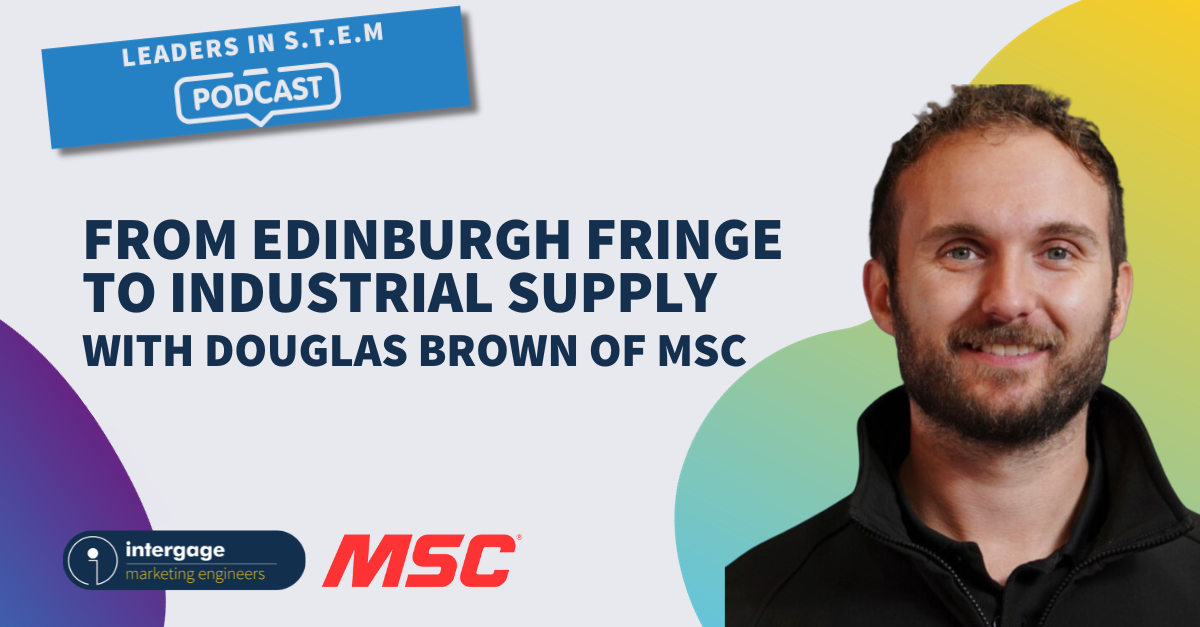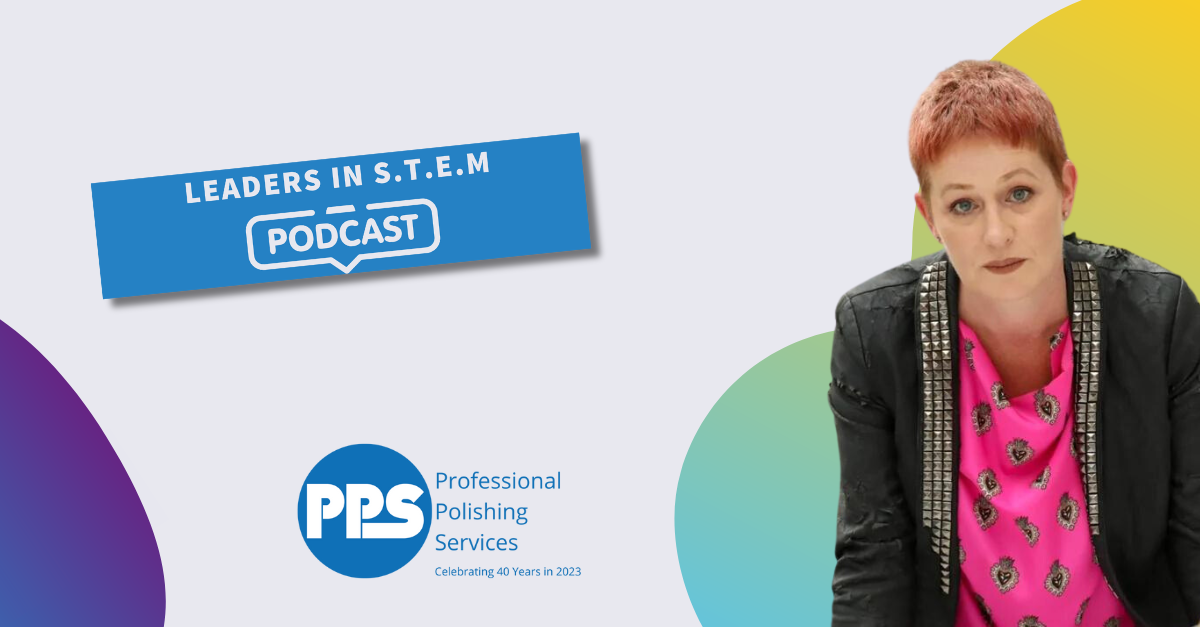Dr Megan Ronayne: Changing Perceptions of 'Made in Britain'
Back in September, we sat down with Dr Megan Ronayne from Innovate UK KTN to discuss her perspective on British manufacturing. Head of Manufacturing and Innovation at the company, Megan gave us an insight into both her background and the current state of Britain's industrial sector.
Changing Perceptions of 'Made in Britain' with Dr Megan Ronayne
Can we start off with a little bit about your story and some of the pivotal moments in your career that have sort know through your academic experience and have taken you to where you are today.
So I actually started off in geography. I did geography at the University of Birmingham, and I was sitting in a lecture one day and we were talking about globalisation. And in that lecture, Professor John Bryson spoke about how the UK manufacturing sector had seen a decline and a demise as it was shifting to lower cost locations where labour is cheaper.
I started university in 2007 and it was very much encouraged to go to university. You were sort of seen as a failure if you were going down the apprenticeship route, which is what we know now is completely wrong. But there was a lot of pressure for everyone to go to university and get those A levels to get to a good university as well. At the time, I was dating my now husband—we've been together since were 16, and he chose to go down the apprenticeship route. I remember at the time; I think there was a little bit of shame around apprenticeships. Oh, he's not got the grades to get into university and he's doing an apprenticeship when he chose to do an apprenticeship with the company where his granddad had worked and things like that, and he had a real passion in the engineering side.
So as were kind of going through the journey of life together in our late teens and early twenties, I was on the university path, and he was on the apprenticeship path, and it was just really fascinating to me about how and why we choose our careers and how we get influenced in what options we go down.
You’ve mentioned alternate routes into industry there—what advice do you have for young people at the beginning of their careers?
I think the fact that the sector is so diverse in terms of what it does, and I think that's an important message to get across because I think traditionally it has been it's only for engineers. So, if you are doing engineering or maths at university or an apprenticeship, that's more focused on those STEM subjects. There’s a conception which suggests that's the only reason why you should be working in manufacturing when any manufacturing business has so many different components and skill sets that it requires. You have the marketing, there's the sales, there's the design side.
Honestly, more manufacturers need computer science-type skills rather than engineers. As we go towards more automation, AI, and the digitalisation technology side of things, they're going to need a whole different skill set. They're going to need people that could be able to do coding. They're going to need people that are going to be able to do social media to also promote their products or processes or attract new people into their business as they go forward. They need people in finance and business strategy, HR, and planning. It’s wide and diverse.
And then in terms of that, what's your perspective on how good, bad or indifferent UK manufacturers are at selling themselves, essentially?
I think we've still got some responsibility in how we sell ourselves. I think we can be guilty that like you say, people know who we are, where we are—but young people don't. If you go around schools and universities, they don't know a lot about what we do in the UK because we're not on Instagram or we're not on TikTok, and we need to be on those channels. We need to be on the channels that they are looking at every day and that they're interested in.
Doing social media, I mean everyone has got an opinion on social media, good or bad. But I think as a promotional tool, it's important to kind of open people's eyes up to a bigger world of manufacturing and what you do. And it does have to be through the videos, podcasts, things like that.
Marketing is much bigger than a lot of people think it is, then?
Marketing has become key. And, when I was working at the University of Nottingham during the Pandemic in 2020, I was managing the postgraduate placement, so PhD-level placements. And we worked with a lot of manufacturers during the first lockdown, and they didn't want engineer placements because they couldn't be on site or in the factory or on the shop floor, but what they needed was marketing placements, right? We saw a huge c. 60% increase in the demand for marketing for PhD, or engineers that had the marketing essence to them, that were able to do some videos or help improve their website or think about their social media strategy. And that's what the manufacturers needed in the pandemic because we were all virtual and they suddenly realised they didn't have a virtual offering. They were like, oh gosh, how are we going to connect with our customers or future skills or anything?
Can you share recent projects or successes that exemplify how Innovate UK and KTN support our sector?
Innovate UK is the Government's Innovation Agency. So, we're all about creating positive change, moving innovations forward, helping to grow companies. And then there's a lot of funding involved in that to help companies progress their innovation projects. That might be by themselves, or it might be a collaborative research project where they work with another university or with another business, and we do thousands and thousands of those, which is amazing.
We develop a huge national and international network for manufacturing to also find other partners to work together to innovate or to problem solve or even just to inspire one another to help grow or develop or question things. And we also help connect manufacturers with all the universities across the UK to help with any kind of product innovation, process innovation, or even the service innovation. There's some great business modelling out there for manufacturing where to be competitive and internationally competitive. It's becoming more and more dependent on your services that you provide to your customers, what pain you're taking away from them. Innovate UK is that connection side.
The best kind of case study that I've seen since I've been within KTN in the last 18 months has been from Mike Hague-Morgan from Autographed Solutions Group. Mike emailed me when I joined to say, “you do realize that we grew from £7 million a year to £70 million a year through Innovate UK, Connect and KTN to adopt digital technologies. Through that connection arm of coming to some networking events, they met and learned about new technologies that were happening in the sector to then start adopting basic camera technology on their shop floor. And it absolutely transformed the way they worked with their customers, their traceability, their transparency, their insurance side of the product. And then that just grew their company massively since 2016.
Ten times growth is phenomenal! Was that using cameras for visual inspection on production lines—outgoing Quality Control and such?
Yes, it was. It was just from being at a networking event where they met a student that was into camera technology, right? Again, they would never really have met each other unless it was for this kind of networking event that Innovate UK KTN was running that the student was talking to Mark about camera technology. And he was like, “well, we're not interested in that.” And the student was like, “yeah, but you should because it's the future and this is what you'll be able to do with it.”
It got Mike really thinking about visual inspection and kind of providing that transparency and traceability of their products. Through that, they've just really automated the shop floor in Grantham, and they just keep adding digital technologies on. But he knows, had it not been for networking through Innovate UK KTN he wouldn’t have met this student, and they wouldn’t have grown.
If you had to pick the kind of three or four things that are kind of front of mind for you and your colleagues now in terms of those challenges and opportunities, what would those be?
I'm a very positive person! I'll always focus on the opportunities for with the UK manufacturing sector. Obviously, we've covered some of the challenges with the skills gap—and that is ongoing. But I think if we focus on some of the opportunities, I think we'll attract the younger generation into our sector.
One of the first things being sustainability and meeting net zero targets Innovate UK released last year. Their vision for 2050, which is a living document to work through with industry. It's not a type of, “this is your footprint, and you must follow this,” document. After all, we're all learning this together, aren't we? What does it mean to be net zero? What does it mean to be sustainable? How is that going to impact the UK manufacturing sector? Where does the manufacturer even start to go on that journey of becoming more sustainable and reaching net zero targets?
There’s going to be businesses where they've done production in a certain way for 200 years and they’re using machinery that's 100 years old. How do we help improve those efficiencies and their carbon footprint? So that Vision 2050 is really important for us to help kind of inspire and guide as much as possible manufacturers through the journey, but also learn from them about what's working and what's not working as we go on this journey.
I think young people actually want to help manufacturers on that journey, too. Manufacturers are open to it, and open to holding their hands up and going, “actually, I don’t know where to start, I don’t know what we’re doing.” They could take on student graduates to kind of help them on that journey of sustainability, being champions and going, “we’ll help you to work out how we’re going to do this.” There’s a lot of learning to be done, and we can only learn from each other if we’re networking with one another. So that’s an important aspect too.
To move away from your work life, would you mind sharing what Scavenger Sundays are?
Every Sunday on LinkedIn I post a video highlighting something in my house made in the UK.
I started a few years ago just posting when I could to kind of promote when I found something made in the UK to kind of go, “oh wow, this carpet is made in the UK, or this piece of clothing, or my mug from Denby.” I found that people were really interested in it because they've not thought about where their things were made.
I guess for the last five and ten years, I've been sort of interested in the origin of my stuff. I was getting into a habit of checking labels all the time, so if I was shopping, I was checking labels where's it from, where's it been manufactured. I wonder what the supply chain looks know and getting interested in knowing if a product can be made in five different countries. So, what is the origin of that? I just got excited when things were made in the UK. It came to me early one morning of like, okay, maybe I'll do something like a series about this. So rather than being ad hoc on social media, maybe there could be a place where I could post regularly. I actually spent one night going around my house, auditing my house.
I bet that was interesting for your husband to watch.
He was like, “what are you doing?” I was like, “I'm making inventory of what we own that's made in the UK.” He was like, “okay, whatever, Megan.” I think he just goes along with it. So, I made this inventory and I was like, wow, we've got like a hundred things made in the UK. I could post one a week, and if I post it on a Sunday, I could call it Scavenger Sunday. And it could be like, “and I've gone on a scavenger hunt around my home and found all these!” Actually, we keep finding more and more. So it's a bit like when you start focusing on something, you're like, “oh, actually, this is made in the UK and this is made in the UK.” So. Yeah. Call it calendar Sunday. I make these little videos just to really broaden, again, our visibility of UK manufacturing and to show how diverse it is as a sector.
Do you have any particularly intriguing examples?
Oh, your wheelie bin is made in Rotherham. So everyone with a wheelie bin has something made in the UK, made in Yorkshire.
That’s fascinating! On a different note, what’s the Changing Perceptions conference you’ve got coming up?
Yes, we've got our conference called Changing Perceptions and it's run by the Women in Manufacturing initiative and it's on the 31 October at the MTC in Coventry. We’ve got panel sessions and we've got keynote speeches and we've got six different workshops all about how we increase the diversity representation in UK manufacturing. So, yes, it's about gender representation, but we're also going to cover other elements of equality, diversity, and inclusion as well, throughout the day. And the reason why it's important is, I think women represent 51% of the UK population now, which is slightly over half, but we're only about 26% of the workforce in the UK manufacturing sector. And, when you look at even the skilled trade jobs in manufacturing and the engineering jobs, it's a lot lower than that. I believe somewhere between 10 and 15%.
The reason why I've not chosen women in engineering is because we want to represent those broad different types of jobs within manufacturing—not just engineers, but business support services, marketing, sales, commerce, all those kinds of thing. That will help us with the skills gap because absolutely, the more women we can get into the sector, the more attractive we can make the sector look to women as well, that will help us decrease the skills gap and the skills shortage as well. So it's a responsibility of all of us to start talking about why it's not really been improved. As much as we're seeing, I think, maybe visually, more women out there in the sector, I think when we were speaking to the Department of Business, they were saying the stats haven't improved that much in the last ten years.
There’s still a job to do.
Then just to wrap up: if you have any spare time, what other kind of things do you like to do?
So, I collect wedgwood, made in the UK. I like to go into antique stores on the weekends and kind of scavenger hunt for those as well. But really, I like to look for Made in the UK goods when I'm out and about. I like factory experiences, so obviously I get to go into a lot of factories in my role, in my job, in my career. But I like the customer experience ones like Wedgwood in Stoke on Trent, Cadbury's factory, Denby Pottery, the Black Country Museum for the history of manufacturing in the West Midlands. So I like doing that.
But then also, I do a lot of running now because I'm running the London Marathon in April 2024. Unfortunately my dad died of pancreatic cancer two years ago—it was something I’d never heard of before my dad was diagnosed. Only 5% of people diagnosed with pancreatic cancer survive three months because they usually diagnose it too late. So I’m running for the pancreatic cancer team – we need to raise more money to enable the research to happen, to make improvements in earlier diagnosis and support for other families.
You can listen to Megan's episode of Leaders in STEM on Spotify, along with all our other episodes!



